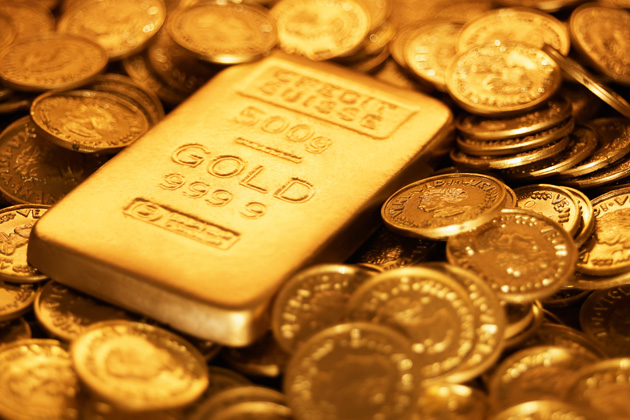Gold prices went downward on Thursday after the United States and China signalled willingness to resolve a trade dispute through negotiations, reducing demand for bullion as a safe place to park assets.
Investors moved money back into equities, sending global stock markets higher, while the dollar strengthened, making gold more expensive for users of other currencies.
“It’s been a double whammy (for gold),” said Fawad Razaqzada, a FOREX analyst.
“Stock markets have stabilised, at least for the time being, and that has reduced demand for safe havens.”
The slide in gold prices had also created a negative technical picture that encouraged further selling, Razaqzada said.
Spot gold was down 0.4 percent at $1,327.11 an ounce at 1107 GMT.
U.S. gold futures were 0.7 percent lower at $1,331 an ounce.
Gold had surged to $1,348.06 on Wednesday after China threatened to retaliate against proposed U.S. tariffs on Chinese imports worth around $50 billion with its own threatened duties on U.S. imports including soybeans,
planes, cars, whiskey and chemicals.
Both Washington and Beijing later said they were willing to negotiate a resolution.
Trump’s top economic adviser called the announcements by the two countries mere opening proposals and suggested the U.S. tariffs may never go into effect, while China’s ambassador in Washington said Beijing’s preference was to resolve the dispute through talks.
Technical support for gold was now around $1,320 and the 100-day moving average at $1,311, said MKS trader Sam Laughlin.
Gold prices reached an 18-month high of $1,366,07 in January but have since then been locked in a trading range between around $1,310 and $1,360.
Investors were looking ahead to U.S. jobs data on Friday to give a new direction to prices. Strong employment and wage growth would encourage the U.S.
Federal Reserve to raise interest rates more aggressively and push gold prices
lower.
Gold is sensitive to rising interest rates because they push up bond yields, reducing the attractiveness of non-yielding bullion, and tend to boost the dollar, in which gold is priced.
Trading volumes were likely to be lower however with markets in mainland
China, the world’s largest gold consumer, closed on Thursday and Friday for the Tomb Sweeping Day holiday.
In other precious metals, spot silver was up 0.1 percent at $16.29 an ounce.
Platinum was 0.1 percent lower at $911.20 an ounce after touching $901.50, its lowest since December.
Palladium was up 0.1 percent at $925.25 an ounce but still close to Wednesday’s six-month low of $913.
Source: Reuters













